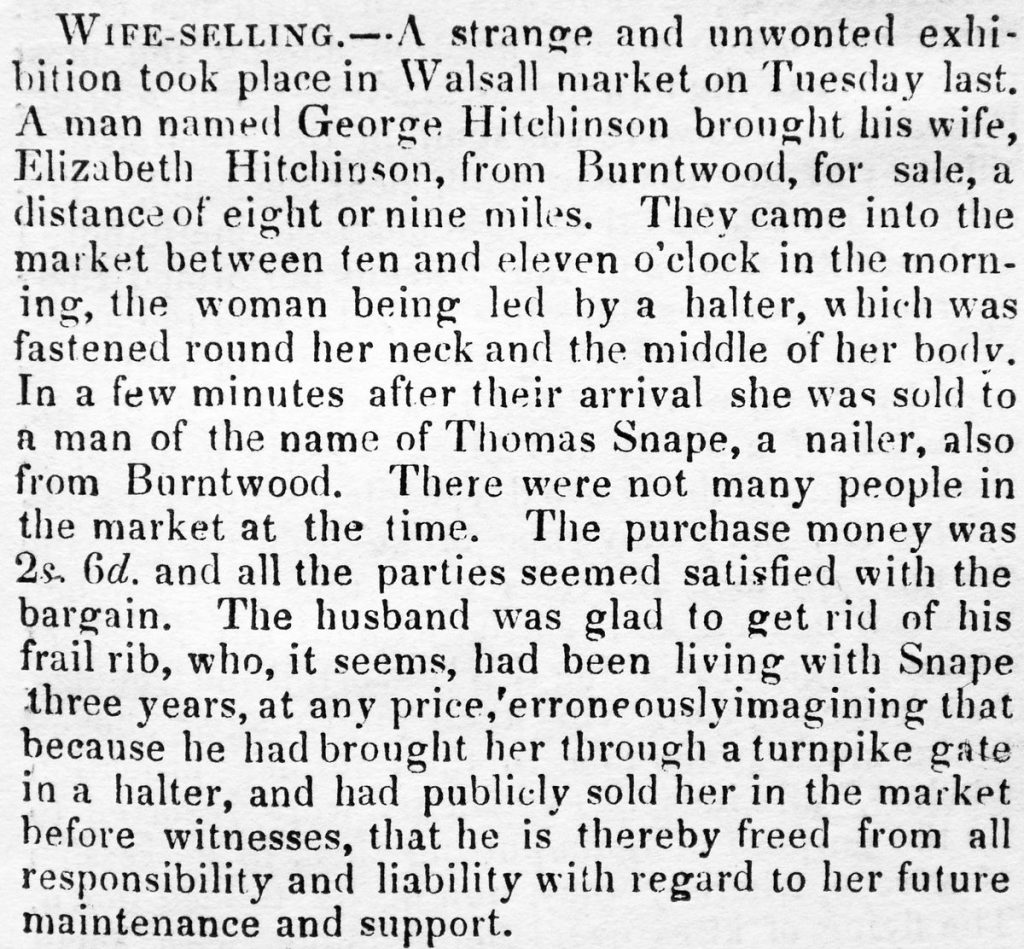
A strange and unwonted exhibition took place in Walsall market on Tuesday last,” the Wolverhampton Chronicle said.
“A man named George Hitchinson brought his wife, Elizabeth Hitchinson, from Burntwood, for sale, a distance of eight or nine miles. They came into the market between ten and eleven o’clock in the morning, the woman being led by a halter, which was fastened round her neck and the middle of her body. “
“In a few minutes after their arrival she was sold to a man of the name of Thomas Snape, a nailer, also from Burntwood. There were not many people in the market at the time. “
“The purchase money was 2s 6d [about 13p today] and all the parties seemed satisfied with the bargain. “The husband was glad to get rid of his frail rib, who, it seems, had been living with Snape three years, at any price, erroneously imagining that because he had brought her through a turnpike gate in a halter, and had publicly sold her in the market before witnesses, that he is thereby freed from all responsibility and liability with regard to her future maintenance and support.”
Readers will note the similarity of this to the plot of the Mayor of Casterbridge by Thomas Hardy, published in 1886. Michael Henchard, gets drunk on spiked Fumity – a mixture of Corn, milk, raisins and currents to which the Furmity Woman at Weydon-Priors Fair adds Rum. Henchard in a drunken rage offers his wife for safe, and she is purchased by Richard Newson, a sailor who has a successful relationship with Henchard’s wife until the sailor is drowned.
While not exactly legal, records show that wife-selling at markets happened occasionally from the 17th Century onwards. As in the case at Walsall Market it seems to have been a recognised mechanism to end an unsuccessful marriage. In both factual and fictional cases the wife accepts the sale to rid herself of a difficult husband. The husband is relieved of his life long duty to be financially responsible for his wife, and, for a fee, he passes that duty on to the seller.
The sale seems to a modern onlooker to be a humiliation while in fact the public nature of it might be rather a public acknowledgement that the marriage has irrevocably broken down, and that another union has superseded the failed marriage. In the Walsall case the new husband has in fact been living with the wife for some years.
At this time there was no legal way to divorce except by the means of an expensive private act of Parliament far beyond the reach of any but the richest. Marriage itself was also a looser institution than we think. Hand-fasting and common-law marriages were very common in pre-Victorian times.
Tomorrow we are going on a skimmity ride.
Discover more from And Did Those Feet
Subscribe to get the latest posts sent to your email.

One Reply to “Wife-Selling & the bonds of Marriage”